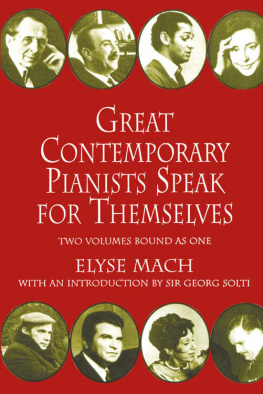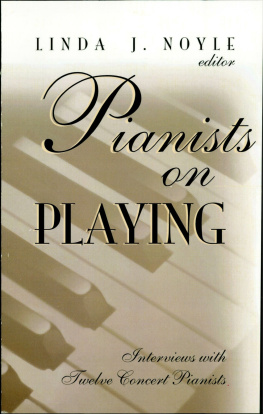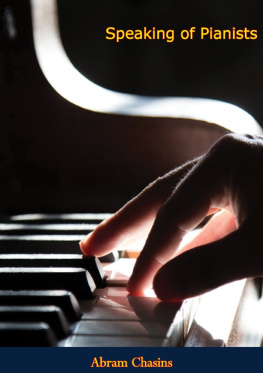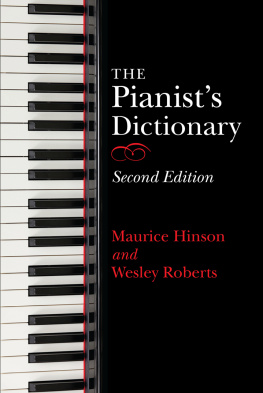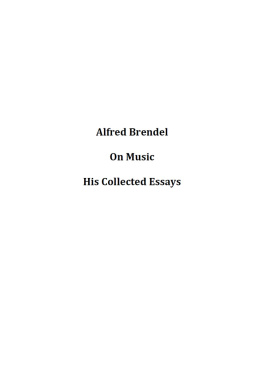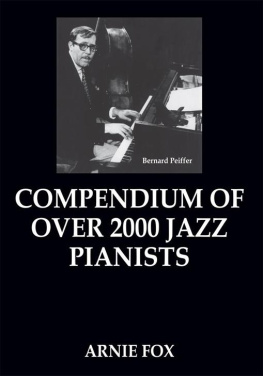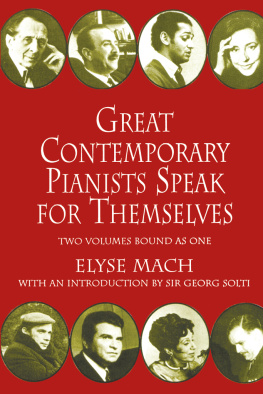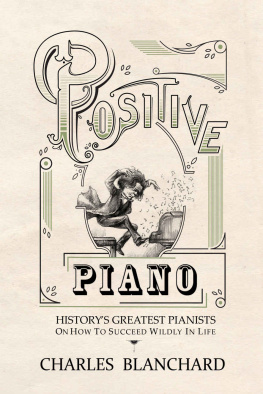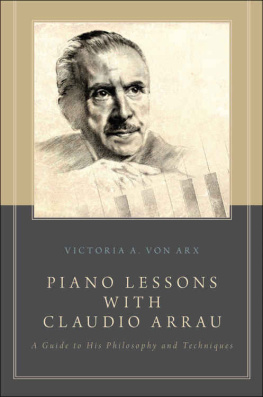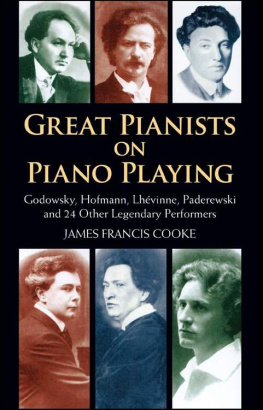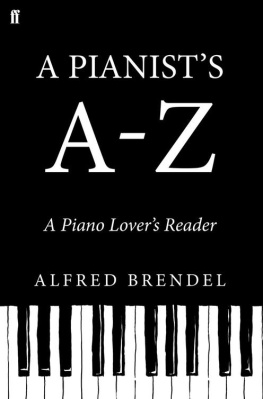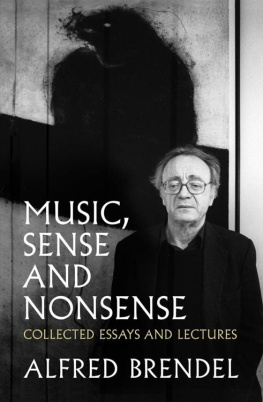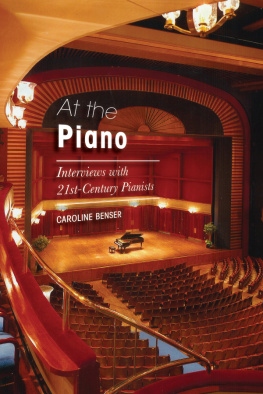GREAT CONTEMPORARY PIANISTS SPEAK FOR THEMSELVES
ELYSE MACH
TWO VOLUMES BOUND AS ONE
DOVER PUBLICATIONS, INC., NEW YORK
Volume 1 copyright 1980 by Elyse Mach.
Volume 2 copyright 1988 by Elyse Mach.
All rights reserved.
This Dover edition, first published in 1991, is an unabridged republication of Great Pianists Speak for Themselves, Volumes 1 and 2, originally published by Dodd, Mead and Company, Inc., New York, in 1980 and 1988. The frontispiece to Volume 2 has been deleted.
Library of Congress Cataloging-in-Publication Data
Mach, Elyse.
[Great pianists speak for themselves]
Great contemporary pianists speak for themselves / Elyse Mach.
p. cm.
Reprint. Originally published: Great pianists speak for themselves.
New York : Dodd, Mead, 19801988.
eISBN-13: 978-0-486-17354-2
1. PianistsInterviews. I. Title.
[ML397.M28 1991]
786.2092`2dc20
90-27877
CIP
MN
Manufactured in the United States by Courier Corporation
26695807
www.doverpublications.com
GREAT CONTEMPORARY PIANISTS SPEAK FOR THEMSELVES
ELYSE MACH
VOLUME 1
TO AUNT LISA
You see my piano is for me what his frigate is to a sailor, or his horse to an Arabmore indeed: it is my very self, my mother tongue, my life. Within its seven octaves it encloses the whole range of an orchestra, and a mans ten fingers have the power to reproduce the harmonies which are created by hundreds of performers.
Franz Liszt, in an open letter to Adolphe Pictet, written in Chambry, September 1837, and published in the Gazette musicale of February 11, 1838
ACKNOWLEDGMENTS

EVERY book is the product of the thought and work of many people, and I am especially grateful to those individuals whose generous help has made this book possible. Special acknowledgments go to Allen Klots, my editor, for his encouragement, pertinent suggestions, and professional expertise on the preparation of this manuscript; to Robert Silverman, editor and publisher of The Piano Quarterly, for his immeasurable help and advice on various phases of this project, and for granting permission to reprint excerpts of my earlier interview with Vladimir Horowitz, and an excerpt from Brede and Gloria Ackermans interview with Andr Watts; to my dear friends and colleagues Anthony Brenner, Chicago City College, Ann and David Pope, Bowling Green State University, and William Schutt, Northeastern Illinois University, for their valuable help on the interviews and incisive comments on the manuscript; to the directors and staffs of the artist managements and personal managements, namely, Herbert Barrett Management, Herbert Breslin, Inc., Colbert Artists, Columbia Artists, ICM Artists, Judd Concert Bureau, Allied Arts Association, Alix Williamson, and Friede Rothe, for their professional support and invaluable assistance in arranging interviews with the artists and for responding so graciously to my requests for biographical information, photographs, and other data; to Robert Meissner, Kim Kronenberg, and Beatrice Stein, for their great assistance in contacting artists and procuring information and materials; to the late Harry Zelzer and his wife Sarah, for their generous help on the artist interviews; to Jerry Bush for his fine technical assistance; to Pauline Durack and Margaret Lynch, for their enormous assistance at home taking care of my three sons, Sean, Aaron and Andrew; to the members of my family, for their patient understanding and cooperation despite the inconveniences while this book was in preparation; and finally, to the artists, a very special measure of thanks for their generosity in granting interviews.
Elyse Mach
CONTENTS

INTRODUCTION

TO attempt a definition of the nature of a concert pianist is to try to capture the wind. Some were born into a family of music, it is true, but few can boast of the outstanding pianistic abilities of parents or grandparents. Indeed, many overcame the opposition of a family to a musical career. Some began to show a musical preference almost as soon as they could walk; others developed somewhat along the lines of their physical maturity.
But all had somethingthe talent; it had to be there, because musical talent is something that cannot be learned. Such superb pianists as Chopin, Liszt, Rachmaninoff, Sauer, Cortot, Backhaus, to name a fewthey all had it, and the artists in this book have it. No one can make a pianist like them because the mixture of pianist and musician is a marvelous, almost magical mixture. Anyone who is the least bit musical can learn to play the piano up to a certain point, but at that point progress ceases. The magic that makes the concert pianist or any instrumentalist is not there. For want of a better term, I call it a demon, a devil, a benign devil, but a devil nevertheless. Although a concert may last two hours or more, to the audience it seems like two minutes because they have become mesmerized by the demon that sits at the piano. Not every artist has it to the same degree, but each has enough of it to make him an outstanding pianist.
Given the talent, the prospective artist must have a firm determination to succeed. Some call it stubbornness, others, industriousness, but its all the same. To achieve something you believe in is extremely important, especially for the young artist. An artist can always find someone who may not like him personally or agree with him professionally, but he must not allow such attitudes to affect his work or hinder his career. Criticism has to be overcome daily, and a truly good pianist will overcome it. No one can prevent true talent from its rightful destiny. Detours should only serve to make the talent more determined.
It should go without saying that the third ingredient is discipline which is the constant companion of the professional musician; and the virtuoso evolves from that daily practice. Moving the fingers up and down the keyboard becomes for most a daily battle, but one which constantly has to be won. There may have been a few exceptions to the rule, but eventually their absence of discipline caught up with them. The professional pianist can give performances without practicing maybe for a week or two, but usually no longer. As the Polish pianist and statesman, Ignace Paderewski, is known to have once remarked, If I dont practice for one day, I know it; if I dont practice for two days, the critics know it; and if I dont practice for three days, the audience knows it.
As one reads Great Pianists Speak for Themselves, it becomes very clear that these keyboard artists did not rely on a miracle or good luck. They are men and women with talent who through industriousness, discipline, and belief in self-achieved stature have become the great pianists of all time. How they reflect upon themselves, their art, and their music should be very interesting indeed, for these are the thoughts of the artists themselves, not what someone else has chosen to write about them.

PREFACE

Next page
